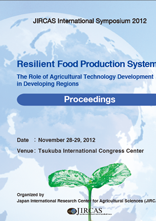Damage from Cold and Snow Disaster (Dzud) and Countermeasure

A dzud, in Mongolian, is an abnormal winter weather condition in northeast Asia characterized by
snowy and cold winters so harsh that livestock are unable to graze through the snow cover, causing
starvation and eventually death. Apparently, damage to Mongolia due to dzud has gotten worse in recent
years. It has also inflicted serious damage and has affected farm management in the region.
Extreme weather is the main reason for livestock mortality in Mongolia. On the other hand, the country’s
livestock population was basically constant up until the early 1990s, but the introduction of market
economy led to high demand for animal products such as cashmere wool and meat. As a result, livestock
population grew rapidly to cope with demand. On average, dzuds strike every 10 years, but it was noted
to have occurred more frequently during the past 10 years, disrupting its normal cycle. This further
increased grazing pressure resulting to pasture degradation and it has been a contributing factor of the
dzud.
It is, therefore, important that a diversified risk management and a grassland conservation system are
established. The objective of the JIRCAS research project in the region is to develop livestock farming
systems which contribute to the mitigation of risks to herder-households and grasslands caused by extreme
weather events. The collaborative research will focus on the following countermeasures:
First, procedures for producing and disseminating rapidly-updated carrying capacity maps at a regional
scale will be developed. These maps will give estimates of reasonable grazing density during autumn to
spring to reduce damage to pasture. To produce the maps, maximum pasture biomass in a year will be
determined during summer seasons using satellite remote sensing technology, and animal intake will be
determined by seasons and pasture types.
Second, information on promising fodder crops and the elucidation of a sustainable cropping system to
minimize soil degradation will be provided. Techniques for the preparation and conservation of
supplemental feeds by ensiling local feed resources will be developed to reduce feed deficiency during
cold seasons. Early fattening techniques for young animals by supplemental feeding will be promoted, and
value-added dairy products will be produced to contribute to risk reduction and to stabilize herders’
household economies.
Third, herder- and farm-management techniques that are resilient to risks will be elucidated, and a riskresilient
pastoral management system will be recommended.
The Mongolian government is now identifying effective ways to reduce the risk of dzud and bring
improvements to the animal husbandry sector. The parliament approved in 2010 the “Mongolian National
Livestock Program”, which settled relevant issues and contained a comprehensive plan for the next 10
years. Three percent (3%) of the annual national budget has been allocated to carry out the program,
whose targets and contents are in agreement with the JIRCAS project. We hope that our research activities
could solidify the program, and that the results would influence policy making decisions by Mongolian
leaders.
| 刊行年月日 | |
|---|---|
| 作成者 | Seishi Yamasaki |
| 著者キーワード |
carrying capasity market economy risk management pastoralism pasture degradation |
| 公開者 | Japan International Research Center for Agricultural Sciences |
| オンライン掲載日 | |
| 号 | 2012 |
| 開始ページ | 46 |
| 終了ページ | 54 |
| 権利 | Japan International Research Center for Agricultural Sciences |
| 言語 | eng |
